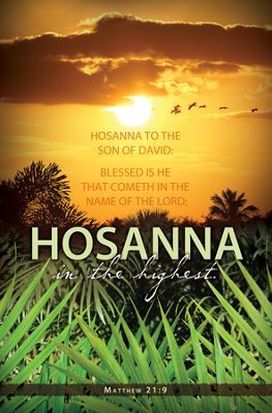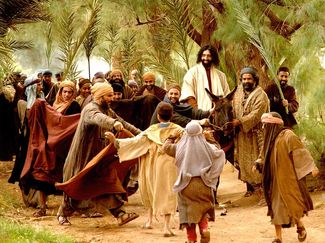
Today is Palm Sunday which marks the start of what is often called “Passion Week,” the final seven days of Jesus' earthly ministry. The Gospels record this day, which has come to be known in Christian tradition, as "Jesus' Triumphal Entry Into Jerusalem.
This entry into Jerusalem was obviously a major event in the ministry of Jesus because it is one of the few incidents appears in all four Gospels making it significant to not only the people of Jesus' day but to Christians throughout history.
The crowds that welcomed Jesus that day shouted Hosanna which in Hebrew means "Save us now". It was their cry for salvation from their Roman oppressors. Their shouts were in response to their belief that the promised Messiah had come in the person of this man Jesus. While they identified Him as their Messiah, and He was, their hope was for a military or political victory over their physical enemies, Jesus had come to give them victory over sin, death, hell, and the grave. The cry was "Hosanna to the Son of David; blessed is He who comes in the name of the Lord, Hosanna in the highest!" Many of them must have wondered if this really was "The Son of David.
Something that is quite interesting about the actions of the people who lined the streets with their garments and palm branches is that the palm branches were really a part of the Feast of Tabernacles, not Passover which was why Jerusalem was packed with people.
Leviticus 23:33-43 (NLT) 33 And the LORD said to Moses,34 “Give the following instructions to the people of Israel. Begin celebrating the Festival of Shelters on the fifteenth day of the appointed month—five days after the Day of Atonement. This festival to the LORD will last for seven days.35 On the first day of the festival you must proclaim an official day for holy assembly, when you do no ordinary work.36 For seven days you must present special gifts to the LORD. The eighth day is another holy day on which you present your special gifts to the LORD. This will be a solemn occasion, and no ordinary work may be done that day.37 (“These are the LORD’s appointed festivals. Celebrate them each year as official days for holy assembly by presenting special gifts to the LORD—burnt offerings, grain offerings, sacrifices, and liquid offerings—each on its proper day.38 These festivals must be observed in addition to the LORD’s regular Sabbath days, and the offerings are in addition to your personal gifts, the offerings you give to fulfill your vows, and the voluntary offerings you present to the LORD.)39 “Remember that this seven-day festival to the LORD—the Festival of Shelters—begins on the fifteenth day of the appointed month, after you have harvested all the produce of the land. The first day and the eighth day of the festival will be days of complete rest.40 On the first day gather branches from magnificent trees—palm fronds, boughs from leafy trees, and willows that grow by the streams. Then celebrate with joy before the LORD your God for seven days.41 You must observe this festival to the LORD for seven days every year. This is a permanent law for you, and it must be observed in the appointed month from generation to generation.42 For seven days you must live outside in little shelters. All native-born Israelites must live in shelters.43 This will remind each new generation of Israelites that I made their ancestors live in shelters when I rescued them from the land of Egypt. I am the LORD your God.”
Leviticus 23:5-8 (NLT) 5 “The LORD’s Passover begins at sundown on the fourteenth day of the first month.6 On the next day, the fifteenth day of the month, you must begin celebrating the Festival of Unleavened Bread. This festival to the LORD continues for seven days, and during that time the bread you eat must be made without yeast.7 On the first day of the festival, all the people must stop their ordinary work and observe an official day for holy assembly.8 For seven days you must present special gifts to the LORD. On the seventh day the people must again stop all their ordinary work to observe an official day for holy assembly.”

Jesus’s entrance into Jerusalem is not a quiet affair. He is met by crowds of people who begin spreading garments on the road. According to 2 Kings 9:13, it was not uncommon for people to lay their garments in the road for a leader to ride over. They did this as a sign of their respect and to indicate their submission to his authority.1 Additionally, branches were cut and spread onto the garments that lined the streets. John 12:13 names the branches as “palm branches,” which were symbols of salvation for the Jews. And salvation was the word on their minds and on their lips. Collectively, the multitude cried out,
Hosanna to the Son of David; blessed is He who comes in the name of the Lord, Hosanna in the highest!
The Hebrew word hosanna is a plea for salvation: “Save us now!” The people were at the right place, but for the wrong reasons, participating in the wrong feast day. Palm branches, cries of hosanna, and shouts of “blessed is he who comes in the name of the Lord” are all elements associated with the Feast of Tabernacles.2 But this was the Passover, a celebration of a different kind.
The title the people spoke, “Son of David,” was a common messianic title. It indicates that the people believed Jesus to be the Messiah they had been waiting for.3 The shouts of hosanna allude to Psalm 118:25-26:
Save us, we pray, O Lord! O Lord, we pray, give us success! Blessed is He who comes in the name of the Lord! We bless you from the house of the Lord.
Simply by saying hosanna, the people were declaring to God that they were tired of their oppression, through with their corrupt leaders. They were asking for liberty, for victory. Unfortunately, the bystanders were not interested in salvation from their own sins, but in salvation from the Romans. What the crowds missed was an understanding of why Jesus had come. He had not come to offer them a military victory over Rome. He came to establish a heavenly kingdom on earth and to conquer the age-old enemies of Adam’s children — sin, death, hell, and the grave.
Jesus was fighting a cosmic battle, bringing rebellious children back into the family of God by making peace with God, not war on Israel’s current national enemies.
In case we are tempted to judge them for their short-sighted focus on freedom from Rome, we should consider how common it is to look for human leaders to deliver us from our own problems. A quick look at American politics will show that we are no different from the Jews in this regard. We would be wise to refrain from throwing proverbial stones at the Jewish people for their misunderstanding of Jesus’s ministry! In fact, they had good reason to think the way they did. Many prophecies of the Old Testament point to a messianic time of vengeance aimed at Israel’s enemies. The people were understanding the scriptures correctly; the Messiah will come at some point to bring judgment. But He had another mission to accomplish first. God’s own people needed to be saved from the consequences of their sin.
1. Kings 9:13 (CSB) states, “Each man quickly took his garment and put it under Jehu on the bare steps. They blew the ram’s horn and proclaimed, ‘Jehu is king!’”
2. See Leviticus 23:33-40 for a detailed outline of the elements incorporated.
3. The Pharisees proved this in Matthew 22:41–42.


 RSS Feed
RSS Feed